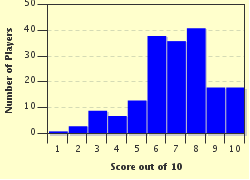Quiz Answer Key and Fun Facts
1. The walk along the mountainside had turned out to be more challenging than expected. With hindsight, the entrance to the park should have read: "Abandon hope all ye who enter here". Where does this phrase originate from?
2. Just 20 minutes ago, I had to cross a narrow ledge. After almost slipping a couple of times I managed to cross safely. I managed to cross by "the skin of my teeth". What is the origin of this phrase?
3. I don't know why I came on this walk. The decision to come was a moment of insanity. When making the decision to come, I was "as mad as a hatter" Where is this expression derived from?
4. Before the walk Tom, my friend, was egging me on. Challenging me to complete the walk. After my objections he used an expression which means "put up or shut up" In other words, I should either do the walk or go home. Which expression did Tom use?
5. Tom promised that I would enjoy the walk. That is extremely unlikely. What expression can I NOT use to indicate an unlikely event?
6. When we got to the aforementioned ledge, Tom complained that I was going too slow. He then left me on my own and walked on ahead. He really "left me in the lurch". To be "left in the lurch" is an expression that was in use in the English language by 1596 already. There are numerous explanations as to the origin of the phrase. Which of the following is one of them?
7. I am really not suited for this walking. I haven't exercised since leaving school twenty years ago. I am "a fish out of the water". English idioms are sometimes very old, or quite recent. How old is this expression?
8. I have just crossed a derelict suspension bridge. With my acrophobia this is the scariest thing I have ever done. Walking just a short way further I come across a fast flowing stream. I now have the choice between going back across that bridge again, or try to cross the stream. Neither are attractive options. Which of the following expressions does NOT relate to a choice between two unpleasant alternatives?
9. There is no way that I can cross that bridge again. I decide to "wing it" and use some vines. I'll tie these to a rock and my waist and then try to wade through the stream. If the current sweeps me away, then I can use the vines to pull myself to shore. What does the term "wing it" mean?
10. I've made it! I crossed the stream safely. Looking back on my experience (and getting to the title of the quiz), I survived this walk in the woods on "a wing and a prayer". Where does this phrase originate from?
Source: Author
pdk42
This quiz was reviewed by FunTrivia editor
looney_tunes before going online.
Any errors found in FunTrivia content are routinely corrected through our feedback system.


